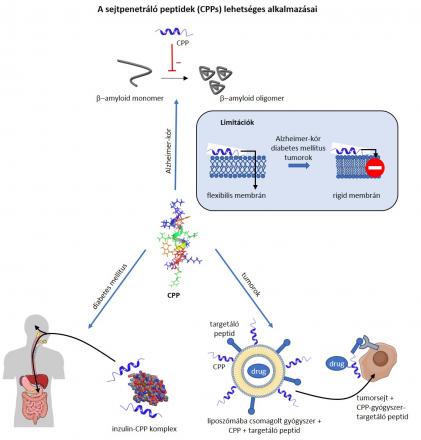
While the cell membrane presents an impenetrable barrier for most large and hydrophilic molecules including therapeutic compounds, cell-penetrating peptides (CPPs) are able to traverse this obstacle without causing cellular damage even when carrying cargos such as various drugs. This peculiarity makes CPPs suitable to deliver drugs and other compounds to intracellular targets or across the blood–brain barrier. Given that cellular entry mechanisms including both energy-independent direct translocation and energy-dependent endocytic processes involve permeation through cellular membranes, the general biophysical properties of membranes can substantially influence the efficiency of cellular entry and thus the biological effects and therapeutic potential of CPP-cargo complexes. In a review, Tamás Kovács, Péter Nagy and their colleagues summarized the entry mechanisms of CPPs and the general principles how the biophysical properties of membranes can alter these processes. In the paper, they gave a brief overview of disorders such as diabetes mellitus, Alzheimer’s disease and various tumors, in which CPP-mediated drug delivery shows great therapeutic promise. However, they argue that alterations in the membrane lipid composition intrinsically associated with these disorders and consequent changes in bilayer properties could extensively reduce therapeutic efficacy of CPP-cargo complexes, and therefore, a beneficial combination with membrane lipid therapies can be expected to enhance the drug delivery mediated by CPPs.
This work was published in the Cells (DOI: https://doi.org/10.3390/cells12131700).Florina Zákány, István M. Mándity, Zoltán Varga, György Panyi, Péter Nagy, Tamás Kovács